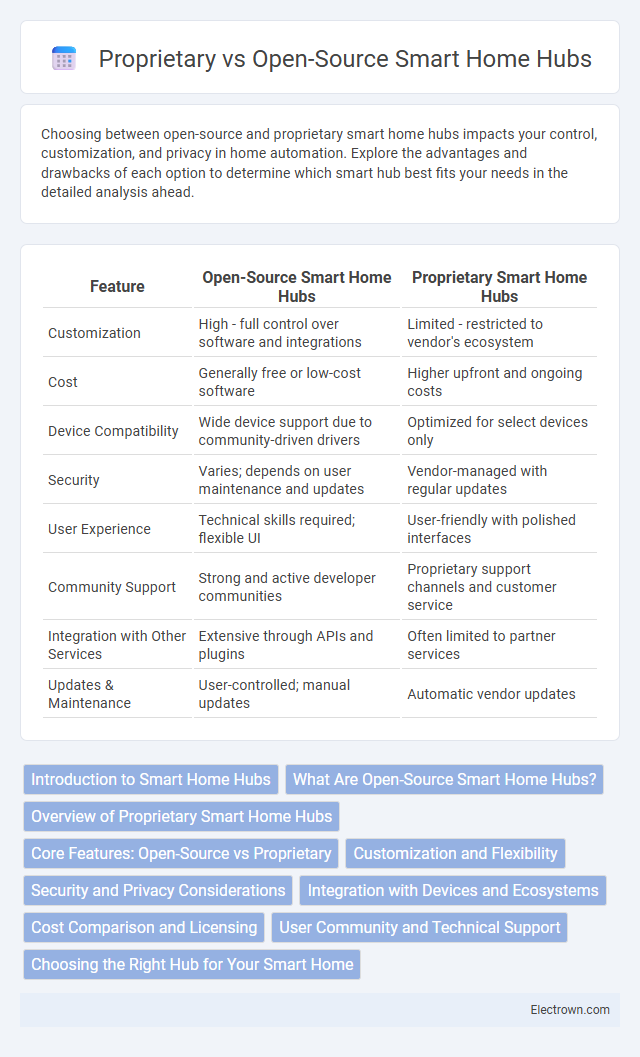Choosing between open-source and proprietary smart home hubs impacts your control, customization, and privacy in home automation. Explore the advantages and drawbacks of each option to determine which smart hub best fits your needs in the detailed analysis ahead.
Table of Comparison
| Feature | Open-Source Smart Home Hubs | Proprietary Smart Home Hubs |
|---|---|---|
| Customization | High - full control over software and integrations | Limited - restricted to vendor's ecosystem |
| Cost | Generally free or low-cost software | Higher upfront and ongoing costs |
| Device Compatibility | Wide device support due to community-driven drivers | Optimized for select devices only |
| Security | Varies; depends on user maintenance and updates | Vendor-managed with regular updates |
| User Experience | Technical skills required; flexible UI | User-friendly with polished interfaces |
| Community Support | Strong and active developer communities | Proprietary support channels and customer service |
| Integration with Other Services | Extensive through APIs and plugins | Often limited to partner services |
| Updates & Maintenance | User-controlled; manual updates | Automatic vendor updates |
Introduction to Smart Home Hubs
Smart home hubs serve as the central control point for connected devices, streamlining automation and enhancing convenience in your living environment. Open-source smart home hubs offer customizable protocols and community-driven support, while proprietary hubs provide polished interfaces with manufacturer-optimized integrations. Choosing between these options impacts system flexibility, security, and compatibility with various smart devices.
What Are Open-Source Smart Home Hubs?
Open-source smart home hubs are platforms that allow users to integrate, control, and automate various smart devices through publicly available software code. These hubs provide enhanced customization, flexibility, and community-driven development, enabling seamless interoperability between brands like Zigbee, Z-Wave, and Wi-Fi devices. Popular examples include Home Assistant and OpenHAB, which empower users to tailor smart home experiences without vendor lock-in or licensing restrictions.
Overview of Proprietary Smart Home Hubs
Proprietary smart home hubs, such as Samsung SmartThings, Amazon Echo, and Google Nest Hub, offer integrated ecosystems with manufacturer-supported hardware and software designed for seamless user experience. These hubs provide robust security updates, dedicated customer support, and compatibility primarily with devices within their own brand or approved partners. While they often feature easy setup and polished interfaces, proprietary systems may limit customization and interoperability compared to open-source alternatives.
Core Features: Open-Source vs Proprietary
Open-source smart home hubs offer extensive customization, interoperability with diverse devices, and transparent security protocols, enabling users to tailor automation to specific needs. Proprietary hubs provide user-friendly interfaces, seamless integration within their brand ecosystems, and dedicated customer support, emphasizing ease of use over flexibility. Both types support essential core features like device management, scene creation, and remote access, but differ significantly in adaptability and control.
Customization and Flexibility
Open-source smart home hubs offer unparalleled customization and flexibility, allowing users to modify software, add integrations, and tailor automation scripts to specific needs without restrictions. Proprietary hubs often limit customization to predefined features and supported devices, prioritizing user-friendly interfaces and seamless out-of-the-box functionality. Users demanding advanced control and adaptability typically prefer open-source solutions for their ability to integrate diverse hardware and innovative technologies.
Security and Privacy Considerations
Open-source smart home hubs offer greater transparency and control over security protocols, allowing users to audit code and customize privacy settings to reduce vulnerabilities. Proprietary hubs often provide robust, automated security updates but may limit user control and data visibility, potentially increasing privacy risks. Evaluating encryption standards, data storage policies, and manufacturer reputation is crucial when considering security and privacy in smart home hubs.
Integration with Devices and Ecosystems
Open-source smart home hubs offer extensive integration capabilities with a wide range of devices and ecosystems due to their customizable and community-driven nature, enabling support for numerous protocols like Zigbee, Z-Wave, and MQTT. Proprietary smart home hubs typically provide seamless integration within their specific brand ecosystems, ensuring optimized performance and user experience but with limited compatibility outside their defined platform. Choosing between open-source and proprietary hubs hinges on the need for broad device support versus streamlined ecosystem integration.
Cost Comparison and Licensing
Open-source smart home hubs typically offer lower upfront costs due to free software licenses and community-driven development, while proprietary hubs often involve higher initial expenses and potential subscription fees. Licensing for open-source platforms is generally based on permissive or copyleft agreements, allowing customization and redistribution without additional charges. Proprietary hubs restrict modifications and redistribute rights through closed licenses, which can increase long-term costs and limit user control.
User Community and Technical Support
Open-source smart home hubs benefit from vibrant user communities that actively share custom integrations, troubleshoot issues collaboratively, and continuously enhance the platform's capabilities. Proprietary hubs often provide dedicated technical support teams, offering structured assistance and warranty services that can be crucial for users seeking guaranteed reliability. Your choice between open-source and proprietary options should consider whether you value community-driven innovation or formal, professional support mechanisms.
Choosing the Right Hub for Your Smart Home
Selecting the right smart home hub hinges on balancing control and convenience: open-source hubs like Home Assistant offer extensive customization and privacy but require technical expertise, while proprietary hubs such as Google Nest or Amazon Echo provide user-friendly setups with seamless integration but limit customization and data control. Compatibility with existing devices and ecosystems significantly influences performance, with proprietary hubs excelling in ecosystem synergy and open-source solutions supporting a wider range of brands and protocols. Evaluating security features, update frequency, and community support ensures your smart home hub aligns with your priorities for privacy, functionality, and long-term scalability.
Open-Source vs Proprietary Smart Home Hubs Infographic

 electrown.com
electrown.com